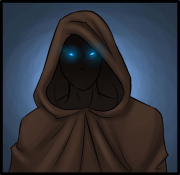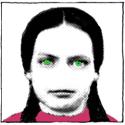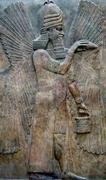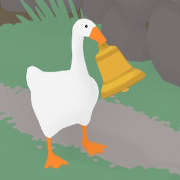|
Without going into detail that I don't have the energy for at the moment, the two big things about the GURPS WoD adaptations are tone and mechanics. I don't know if it's part of the style bible, or just an artifact of Evil Stevie being an old-school kind of development overlord, but they tend to be very straightforward and very light on narrative fluff. One of the first things GURPS Vampire does is set down just what this whole 'gothic-punk' thing is, which I didn't get anywhere near as clearly from reading oVampire. The other thing is, GURPS is one of those big old Grand Unified Theory systems, where everything is ostensibly 'balanced' against everything else, backed up and buffered by a point-buy chargen that doesn't always work as intended. RAW, you should be able to drop someone with minor pyrokinesis in with a group of amateur Autoduellists, who are facing off against some time-lost beginner fantasy adventurers. They tried really hard to fit Vampire into that framework, and you could hear it give out from a mile off. Vampire disciplines (aside the physically oriented ones like Celerity, Potence and Fortitude) were weighted similarly to psi powers and super powers, which, level-for-level, were very cheap. Dominate was about as expensive as Acute Vision, which was a couple of character points, tops. So you could buy up mental Disciplines at an ungodly rate, but you'd also have to buy up the skills to use them properly. Physical disciplines, on the other hand, ramped up in cost very quickly. Instead of handwaving the things vampires could and couldn't do, GURPS applied a huge wodge of a template which... codified the things they could and couldn't do, and applied appropriate point costs or breaks. This made the average neonate in the realm of several hundred character points, in a system where your average human was around 25, your starting adventurers were 100, and your wet-behind-the-cape superheroes were 500 points. This would get even weirder with Werewolf and Mage. Werewolf simply broke the system. The starting template was already in the neighborhood of 400 CP, and where the vampiric disciplines were statted to roughly fall into line with similar powers, they took one look at garou Gifts and giggled. Abilities that might have been worth one or two dots could range from a few to several dozen CP in cost. There was some kind of logic in play, but it certainly wasn't the progression that Disciplines had. Given that the guideline for character progression was maybe a handful of CP an adventure, this could leave certain powers totally out of reach, or eliminate the point of keeping character point tallies in the first place. Mages had similarly loopy character templates, but the basic structure of the Spheres made it easier to say that rank X of any Sphere cost Y points. Both Vampire and Werewolf had Companion books, which were basically the mechanical contents of the appropriate Player's Guides. Vampire's was a bit of a jolt because it also included mechanics for the Sabbat, without a lot of context as to who these new vampires were, or what the heck an Antitribu was. Mage was supposed to receive one, though the main book already contained a fair amount of information about things like Umbrood, Paradox spirits and the Technocracy, but relations between SJG and White Wolf broke down before it or further adaptations of the WoD could be developed.
|
|
|
|

|
| # ? Apr 16, 2024 12:01 |
|
GURPS Castle Falkenstein suffered similar issues, what with Dragons and elves being like 400-600 points just based on their base abilities.
|
|
|
|
Count Chocula posted:Could you use the rules of Awakening and the setting of Ascension? I want to play/be a Hipster Occultist. You'll have to sign your name at the Hot Topic Watchtower first.
|
|
|
|
Hipster Occultist posted:You'll have to sign your name at the Hot Topic Watchtower first. See a Watchtower in your dreams?... Put a Bird on It!
|
|
|
|
gradenko_2000 posted:Classifying your game as "the thinking man's game" is pretentious no doubt, but I largely agree that D&D is wholly unrealistic. It's a game. It's very boardgamey, and the imagination part is just so that you can sketch out a map with pencils instead of going full-out Descent and so you can sort of skirt the edges of the rules if you placed a barrel in a room and someone wants to use it. Oh yeah, it's unrealistic, but "unrealistic" and "requires thought" are too different axes entirely. I've seen some awfully dopey mage players. Asimo posted:Pedophiles. The main answer would be "otherkin". It was an enabler for pedo creeps, but honestly they didn't need the excuse- see also kiddie vamps for games that weren't wise enough to restrict that sort of thing. Or, as the wikipedia article on otherkin says: Wikipedia posted:Rich Dansky (who worked on the development of Changeling: The Dreaming) said that after the game's release the darkfae-l listserv had "a rampaging debate... over how the folks at White Wolf had gotten so much of their existence right", adding, "Finally, one of the list members came to the obvious conclusion that we'd gotten it right because we ourselves were in fact changelings." Dansky denied being non-human. Oh, Dansky. Bieeardo posted:So you could buy up mental Disciplines at an ungodly rate, but you'd also have to buy up the skills to use them properly. Physical disciplines, on the other hand, ramped up in cost very quickly. Yeah, but Celerity remained as broken as ever, could definitely be slotted in by a min-maxer, and combined with a high (and cheap) Gun skill and an automatic weapon (and GURPS' more realistic firearms rules), there wasn't much you couldn't murder. I mean, it was more expensive than Storyteller, but high-level Celerity lasted for hours (I think as many as eight), giving you plenty of time to crunch and munch and refill your blood pool with hyper-speed suck.
|
|
|
|
Ugh, I completely forgot about durations, yeah. I've been trying to remember how aggravated damage (and Protean's Wolf Claws) translated over too. Wasn't there something about damage beyond a certain point going through to Blood Points? Like a vampire was still roughly functional down to -HTx5, but beyond that their physical structure was so ripped up they'd start ablating blood in place of hit points.
|
|
|
|
 Chapter 2: Magick This chapter deals with magick, which is explained to be the age-old technique of lying-with-words - magick is everything and everything is magick, so someone flicking a light switch is doing magick to create light. It's a variation on the motte-and-bailey argument, where you have an easily defensible, if useless, proposition "reality is magick" that you use to defend against falsification, and a less defensible position "magick can do all these supernatural things". Then you just retreat to your unfalsifiable "when I say 'magick' I mean the physical laws" whenever someone challenges your ability to do supernatural things. Though in MTAs this is actually true; flicking a light switch is just a magickal rote spell that lets you turn on the light, with ritual components like "light switch must be connected to lamp" and "power must not be out". Within the context of MTAs, this is not just lofty words, but the actual metaphysics of the setting. It's a pretty interesting premise. The big thing about mages is that they can use more magick than just the rotes of nature's laws. The passages go on to emphasize various aspects about how mages cast magick in practice; their spells tend to have bad consequences, so smart mages maximize the gains against the consequences and use simple spells to create greater effects. It's something of a contentious point amongst some people looking to get into MTAs; the game punishes you for actually casting spells, in a game about casting spells. Personally I don't think this is a problem in of itself; actions having consequences and power-trips not being "free" is a perfectly valid premise for a game, and MTAs has no obligation to let people have their fireball-throwing fantasies. In fact, the premise of the game itself would fall apart if it did; magick has to be secret, and spellcasting having dangerous consequences is a good way to enforce this. That said, I think M20's rules may at times be too restrictive even for its own premise. I'll go into more detail about this when I get to the chapter on actually casting spells, but the short form is that you can easily end up in situations where the consequences of spellcasting become ridiculous and your character becomes useless and/or a liability for everyone around them, almost entirely by accident. The game defines three kinds of magic; the "static" magic of vampires, werewolves, psychics, etc. , the "dynamic" magick of mages, which is powered by their Awakened force of will, and "technomagic", which is a kind of dynamic magic that uses technological tools like science and pseudoscience. Mages also have Resonance and sometimes Synergy, which are weird magical effects that happen around them. For all that I think this book was a huge disappointment, this chapter has so far been pretty good at explaining things in simple terms. I think it might be a bit lofty for someone who doesn't already know a bit about MTAs, but it seems more accessible than any prior edition, at least. M20 posted:Did you ever have a toy that you ruined by playing too hard with it? Or have you ever taken some gift, skill, or talent you had and then made a complete mess of things because you weren’t careful with how you used it? That’s what happens, on a really big scale, when you get careless with Will, pride, and magick – you break things. Brucato, or whichever uncredited intern wrote this, seems to not really have a good command of the English language. The central element to hubris is the pride; you're so sure of your skill that you get careless, not that you misuse it. The ur-example of hubris is the race between the hare and the tortoise; the hare is so sure of its victory that it ends up losing a race. Hubris is being so sure of your own skill or talent that you forget to practice and end up failing. Making a complete mess of things would only be hubris if you in your pride over-estimated your control of the situation. M20 posted:To the Greeks who coined the term, hubris is the shadowside of excellence. It’s that moment when drat, I look good… becomes …so I can do whatever the hell I want. If you’ve ever met one of those arrogant assholes (and face it, we all have) who uses his or her looks or charm or money or whatever in order to feel better at your expense, you understand why hubris sucks. Also while the word hubris is from Ancient Greek, this meaning is modern. To the ancient Greeks, the crime of hubris was more of a crime of excess, like visiting prostitutes and anal sex. Brucato goes on and one about pride and hubris, which is a bit ironic when he doesn't quite seem to understand it. If you're going to make something so central you spend several pages talking about how important it is, it would perhaps be a good idea to now what it is you're talking about? There's a lot of setting text here, and it's not the easiest to talk about. It's not funny, it's not particlarly egregious, it's just dry and drags on for a bit. Things could have been easily summarised and may not have been entirely necessary. Is a creation-myth for MTAs that the narrator themselves seem to regard more as a myth than fact really necessary to understand the setting? I don't recall such a thing being important in any of the other MTAs books, and each of the Traditions are probably going to have their own myths for how the world was created anyway. It talks about the Technocracy at times, as an antagonistic other, but no real context for that is given except the lexicon. Unlike earlier MTAs books, M20 is not as Traditions-centric, which in some ways is good because it makes the game more permissive to other types of campaigns, but at the same time, it means that the context that the Ascension War provided is gone. I can't stand the voice Brucato has adopted as the narrator. It's very... Brucato-esque, full of colloquialisms (sometimes used wrong, as we see) and spoken conventions, and absolutely full of very poor similes and examples. Take this one, for example: M20 posted:So why can’t we Awakened souls do anything we please? If magick is godlike power, why don’t we all just go bowling with fireballs down Main Street, USA? Imagine reality as a large body of water? I can't turn it into confetti? (a mage totally could tough...) I can't turn it into confetti because the water has been here a long time, and because it'll be here a long time? This is a nonsensical statement. It doesn't help explain anything. It then goes on to explain, in somewhat more understandable terms, "Consensus". Consensus is one one of the really controversial things about MTAs. The idea is that the world is the way it is because people believe it is the way it is, and if they believed differently, it'd be different. This is an interesting philosophical concept, and like so many interesting philosophical things, have been misapplied to be concrete and an actual real-world thing. And in MTAs, it happens to be true! M20 posted:As the Baron Harkonnen said in Dune, “he who controls the spice controls the universe.”  We finally get some context here, on page 62; with the explanation of Consensus comes and explanation of who controls Consensus, which is the Technocratic Union. A sidebar also introduces one of the first major changes M20 does to MTAs; it introduces "focus", which is a mix of previous editions' "foci", "paradigm", "belief" and other important things for casting magick. It also explains, for the first time I think, how magick in MTAs actually works in practice; different people can practice magick differently to achieve the same results. Useful to know! Another sidebar explains how to deal with some of the Technocracy as metaplot. Options are presented for various levels of Technocratic victory, ranging from an actual victory (that still allows for Tradition mages to run around) to a partial victory to a seeming victory that is actually more permissive than the partial victory, for some reason... Then we get to the Spheres - these are the fields of magic. Strangely, the wild and divergent beliefs of Nine Mystic Traditions all believe in the same nine fields of distinct magic that happen to correspond to the system mechanically. It's useful for game purposes, but reifying it as actual metaphysics of the setting is really weird; if magick was powered by belief and willpower, one'd think that the metaphysics of magick would also be a matter of belief, with effects grouped as makes sense for the belief, rather than by the arbitrary divisions created by game designers in 1993. I mentioned that the game is more open to non-Traditions play, and to facilitate this, the Technocratic Union's name for the Spheres are also given. Good! Heh, OK, so, back in the metaplot of MTAs, there was this thing about "The Tenth Sphere", which was this mystical tenth practice of magic that nobody really knew what was, but suspected existed, so they went out and looked for it. A lot of MTAs fans considered it a bit stupid, and the final MTAs metaplot book, Ascension, revealed that the Tenth Sphere existed and was Judgement. Having looked at a lot of fan-discussions and fansites in the more recent period, basically nobody cares for this; they always talk about the Nine Mystic Spheres, not the Ten Mystic Spheres. Now, in addition, someone at some point introduced Data as a Technocratic Sphere. I think it was part of the idea that the Spheres weren't set in stone, and the Technocracy, thinking about things in different ways from the Traditions, might have different Spheres altogether, because it's all belief man! The Tenth Sphere and Data are mentioned on the same page, and no connection between the two is made. It might be, you know, useful to know whether the tenth Sphere is or isn't considered the Tenth Sphere. M20 posted:One of the satirical elements of Mage involves the fact that everyone’s doing the same thing but almost no one will admit as much. The fact that all mages use some variation on the same nine Spheres is an intentional reflection of that satire. Also, let me tell you, fictional metaphysics that rarely-if-ever impact the actual game are dead boring to read. Like this: M20 posted:All Spheres are, of course, interconnected, their properties cycling through a circle of connections that unite the principles while keeping each individual field a specialized unit of study and effect. In plain English, one thing leads to another, with all of them playing a part in the greater scheme of things. This has no actual impact on the game! It's just half a page of esoteric fluff, like spending half a page talking about fictional quantum physics in a sci-fi book, only here the sci-fi book 600 pages long, RPG-book sized, and we still haven't met any of the characters or organizations - just pages upon pages upon pages of technobabble. Now we get the sphere descriptions: M20 posted:Correspondence is the anti-Ayn Rand principle. Did I mention the narrator's voice is kind of rambly and uses weird examples? MTAs has the Nine Mystic Spheres: Correspondence, Entropy, Forces, Life, Matter, Mind, Prime, Spirit, and Time. Most of these are pretty self-explanatory. The ones that aren't are Correspondence, Entropy, and Prime. Correspondence is explained as: M20 posted:Everything’s connected in some way. Despite centuries of what’s been called discrete phenomenon perception – that is, the idea that we’re all separate objects and entities that occasionally cross paths – both physics and metaphysics remind us that all things are intrinsically interconnected. Your actions affect me, my actions affect the dog next door, a butterfly flaps his wings and stirs up the proverbial hurricane… that basic idea. Those connections aren’t immediately apparent, of course. If we saw all of the connections between us, we’d probably go insane. It’s no wonder, then, that masters of Correspondence – the Sphere originally called Connection – often seem pretty weird. They perceive unity where the rest of us see division It's actually about movement and teleportation. This is just a bunch of fluff that doesn't explain anything and probably gives the wrong impression. Entropy is about luck, fate, and things breaking down. Prime is for magick dealing with other magick, like magickal materials and stuff. And economics, confirming my suspicions that economics is just loving magic. That's basically the end of that chapter. A whole lot of words explaining, badly, a whole bunch of irrelevant setting details and also some important bits. I think this could have benefited a lot from an editor; someone to slap Brucato with a paper fan every time he let something drag on. It's going to be a recurring problem; half a page can easily get wasted trashing some insignificant pet peeve of Brucato's, which does not help the book's almost 700 pages of length. LatwPIAT fucked around with this message at 10:22 on Jan 17, 2016 |
|
|
|
I think the use of "play chicken" he means is the one where you and another person/force run head-first into each other and the first to flinch or pull away loses. Which is weird because I don't think Paradox would ever pull away (least of all because it's an abstract inhuman idea given a name) because it would want to take your punk-rear end down with it.
|
|
|
|
Hostile V posted:I think the use of "play chicken" he means is the one where you and another person/force run head-first into each other and the first to flinch or pull away loses. Yeah, just me being confused by double negatives.
|
|
|
|
Its amazing that after 20 years of being smacked in the face with how wrong it is for your challengers of the paradigm to use the exact same magic system, the newest Mage has made the satirical subtext the actual text. Not that I'd want to work to make a serviceable system or alter the justification of a twenty-year old brand.
|
|
|
|
And I think in this case it's "Push yourself as close to self-destroying-paradox-backlash as you can before pulling away"
|
|
|
|
Uh, is it alright if I repost my last update? It kinda got swallowed by the thread transition.
|
|
|
|
Yeah, at least for me, "all mages are doing the exact same thing; they're just too foolish to admit it" is a deal-breaker. It makes all the cultural differences and the ups and downs of various ways of thinking into nothing but set-dressing for the real paradigm, which is so simple it almost doesn't exist.
|
|
|
|
Man, I can see why the GURPS books are popular as a setting bible of sorts. As a total Mage newb, this looks like a total nightmare to digest o_O (Then again I'd probably just end up skipping over most of the flowery prose, scanning for sections that look like plain English. I assume this means 3/4 of the book are useless to me?) Rand Brittain posted:Yeah, at least for me, "all mages are doing the exact same thing; they're just too foolish to admit it" is a deal-breaker. It makes all the cultural differences and the ups and downs of various ways of thinking into nothing but set-dressing for the real paradigm, which is so simple it almost doesn't exist. We are all the same in your special snowflakeness. Doresh fucked around with this message at 23:02 on Jan 6, 2016 |
|
|
|
So the book juxtaposes "Paradigm is important that's why you can't turn Werewolves into Silver Lawnchairs" with "Paradigm is a lie", fantastic.
|
|
|
|
I've been saying for awhile Mage's problem is that it doesn't know what kind of game it's trying to be, and though that's mainly true because the old supplements interpreted the game in wildly different directions, having it seem to be the case within the core book is a big issue.
|
|
|
|
It was also the oWoD game hat benefited the least from actually being in the World of Darkness and its related themes, too.
|
|
|
Hipster Occultist posted:You'll have to sign your name at the Hot Topic Watchtower first. Hot Topic is for goths, not hipsters, unless everything's changed since I was a gothy teenager. Your name is just a great premise for a character and it could go in several different directions. Though since old style Hermetic magic is all about knowing things before everyone else and using old old techniques, so that fits the old definition - but I'm thinking more of an Unknown Armies type thing. Knowledge of bands and odd bars as the Secret Knowledge of the modern world. I think I played this guy. quote:This cycle creates things out of apparent nothingness – from the initial conception of an idea, to its form, to the perception of its form, to the decay of that form so that the idea, its materials, and its essence can return to the first point of the cycle and begin all over again in some new state. Each step of that cycle involves a series of Spheres. From original conception in the energy field of Prime, an effect gets focused through consciousness in the Mind and attains substance through the Spirit. Given form in Patterns of Forces, Life, or Matter, the substance interacts with other Patterns through Correspondence and Time. Finally, it breaks down through Entropy, its elements dispersed back to the Prime to start all over again. If there is a Tenth Sphere, it probably governs the entire process, like a circle that encloses this cycle, keeping it Reminds me of Promethea and it's explanation of the Hermetic mindset. Is there a Sephirot diagram that explains this? And I should probably stop defending this book, but in a game all about metaphysics, knowing the basic metaphysical flow of the game works for me. I wish the book would straight up ADMIT it's about playing Chaos Magicians, who use whatever works - whether it's invoking God, Cthulhu, or Superman - to make magickal effects. And those Chaos Magicians are opposed by the static, unchaning Technocracy. It brings the whole thing closer to The Invisibles, which must have been it's main inspiration, and has a party of a Matrix superspy, a Mayan sorceress, a voodoo DJ, and a bunch of other familiar Mage characters. It would also bind the metaphysics of the setting closer to the mechanics.
|
|
|
|
|
Kurieg posted:Well since I'm being nice and waiting on Beast, I might as well do something else. 
|
|
|
|
Rand Brittain posted:Yeah, at least for me, "all mages are doing the exact same thing; they're just too foolish to admit it" is a deal-breaker. It makes all the cultural differences and the ups and downs of various ways of thinking into nothing but set-dressing for the real paradigm, which is so simple it almost doesn't exist. By my reading, M20 is full-on Purple Paradigm all the way through. As long as you believe you can accomplish anything, it's actually just belief-powered willpower, and everyone are really doing Chaos Magick. And, thematically appropriate for Chaos Magick and not very appropriate for anything else, the game seems to be rather lenient about letting people change their beliefs to suit the casting of magic - like the Kung Fu, acid-dropping Virtual Adepts, who can draw upon three different beliefs about how magick works because it's really just chaos magick in disguise. Count Chocula posted:Reminds me of Promethea and it's explanation of the Hermetic mindset. Is there a Sephirot diagram that explains this? And I should probably stop defending this book, but in a game all about metaphysics, knowing the basic metaphysical flow of the game works for me. There is an actual diagram, yes, though it's just a circle. Asimo posted:It was also the oWoD game hat benefited the least from actually being in the World of Darkness and its related themes, too. Many of the related themes of the early World of Darkness are appropriate for MTAs; punk-ish rebellion against authority and blatant pandering to subcultures with money to spend.
|
|
|
|
I feel you're somewhat biased in this regard.
|
|
|
LatwPIAT posted:By my reading, M20 is full-on Purple Paradigm all the way through. As long as you believe you can accomplish anything, it's actually just belief-powered willpower, and everyone are really doing Chaos Magick. And, thematically appropriate for Chaos Magick and not very appropriate for anything else, the game seems to be rather lenient about letting people change their beliefs to suit the casting of magic - like the Kung Fu, acid-dropping Virtual Adepts, who can draw upon three different beliefs about how magick works because it's really just chaos magick in disguise. I have no idea why I'm choosing this hill to die on, but I maintain that kung fu, acid-dropping Virtual Adepts are completly in paradigm, since acid culture has been part of computer culture since the very start to last week's weird story about Silicon Valley pros microdosing with LSD to improve productivity and just general terrible Burning Man culture. Or the Noisebridge 'hacker house' thread in YOSPOS that I lost, full of weird anarchist biohacker techies. That kind of thing would make a great game. Mage is shaped by Belief, right? So as a non-techie, I choose to belive that techie-mages are living a Hackers/cyberpunk life when they're not building weird machines at Burning Man, and I think that's totally valid. I also think in the 'real world' people mix and match beliefs - Catholics into New Age stuff, or the kind of people who post a million different flavors of weird meme on Facebook. Does M20 address the fact that by the setting of the game, Christian Fundamentalist areas should operate under weird Biblical physics? I almost typed "I'm not sure if you grok Mage's vibe". FMguru posted:The vibe I always got from C:tD and it's most obnoxious adherents was that it was meant for self-consciously quirky, creative, commit-random-acts-of-beauty (shading into actual mental illness) types who fail out of art school with $50,000 of undischargable student debt. The exaltation of childhood innocence and the notion that adulthood is the death of one's true self gives it its creepy pedo undercurrent. I know enough of those people (art students, not pedos) that I can sympathize with the old Changeling to an extant. Again, they're on very obnoxious Facebook pages. Count Chocula fucked around with this message at 02:18 on Jan 7, 2016 |
|
|
|
|
Wishes of long life and excitement to the fourth incarnation of our beautiful mess of a thread.Count Chocula posted:Does M20 address the fact that by the setting of the game, Christian Fundamentalist areas should operate under weird Biblical physics? Also, Inklesspen, I'm noticing the currently done parts of my GURPS Technomancer review haven't shown up in the off-site compendium. Have you not gotten that far, or were they just lost in the shuffle? EDIT: If so, they're here, here, and here so you don't have to waste time trying to hunt down my garbage. Fossilized Rappy fucked around with this message at 03:21 on Jan 7, 2016 |
|
|
|
oh dear god the mage arguments are eating the thread shut up about paradigms you assholes
|
|
|
|
I think these guys ought to be able to have creative interface but at some point you're all becoming a bunch of snarky Orphans and there's no point in having these disparate groups at all. If a part of the point of the game is that the Traditions are starting to huddle up and fuse together because they have no choice, that's actually pretty cool, but you could make that more explicit. I also got the feeling that Mage kind of had what I felt happened with Scion happen to it - they build the entire concept around a particular style of doing things (probably the Hermetics for Mage, probably the Greeks for Scion) and kind of made everyone else into a different version of that. This is a pretty common White Wolf practice, now that I think about it; it just pops less in the earlier WoD games, because everyone is in fact doing BASICALLY the same thing (being a dracula, raging furrily) while in Mage, you're actually doing nine completely different sets of things, several of which include drastically different sets of other things inside of them. Mors Rattus posted:oh dear god the mage arguments are eating the thread shut up about paradigms you assholes
|
|
|
|
|
 Chapter 3: The Shadow World Chapter 3: M20 is set in the World of Darkness, let's not forget: M20 posted:Rats breed while children starve. The rich have more money than God, and the poor pray to get through another day with food on the table and a roof over their heads. Lots of people don’t have even that much. Cruel laws and social indifference have packed the streets with lost and homeless souls. Ayn Rand’s philosophy of parasitic prosperity reached its full poisonous bloom in this world. M20 posted:Is it any wonder, then, that folks spend more time with TVs than with the world around them? When you step outside your ring of safety, it’s a pretty scary world. Get with the times Brucato, it's not TV, it's smartphones that are the new evil! Descriptions like these go on and on and on. There's an entire page that repeats the same message through examples, about how horrible the world is. And then we get to this: M20 posted:The so-called Holy Land burns with insane zeal – and with three religions literally hell-bent on bringing about their Apocalypse, we might still see the visions of that demented scripture played out on the global stage. What a... sensitive treatment of religion. "Insane zeal"? The religions themselves being hell-bent on bringing about Apocalypse? "Demented scripture"? Wow. There'll be more of this later, too. M20 posted:Social media and a consolidated mass-media machine have turned us into a global box of angry rats, biting our neighbors over each perceived infraction. Ah, there we are. Finally a rant that isn't stuck in the 90's. Anyway, the world is horrible because of media and all the fear it creates, because everyone are scared of terrorism and kidnapping and murderers and daily holocausts, and there's child labour and sexual abuse and there's nothing good anywhere. All the kindly priests are actually pedophile rapists and all the nice girls sell their virginity on the Internet to be preyed upon by sexual predators and would you loving stop it. It's the World of Darkness but there comes a point at which when you try to make commentary about the real world, it becomes very obvious you're trying too hard. If the media creates all these fears, then what about the RPG books, that speak about these injustices that we have become so complacent to? Cynically cashing in on, well, cynicism, spreading fear and making the world seem so horrible, just to sell a game about Kung Fu wizards fighting the Terminator? And when the Traditions say that the Technocracy is the cause of all this badness, and when the Technocracy blames the Traditions, they're mistaken, because everyone were at fault by letting it happen. So I guess trying to make the world a better place by punching the Technocracy in the face is off the table then? Seems like a bit of a mean rug-pull; three editions of the same gameline setting up the Technocracy as the enemy that, if defeated, will allow the world to become full of joy... and then, nope, everyone's fault, destroying the Technocracy won't change a thing. It seems weird, to reify the problems of the world in the Technocracy, and then claim that defeating the Technocracy won't fix the problems it represents. Then it talks a bit about the bright side of things, which is that a) there are extraordinary individuals who try to make things better, and b) all those iPhones that are so evil and desensitizing actually make people more aware of the world, so they'll be motivated to overthrowing the evil hierarchies. Can you really have it both ways? Social media is bad and mass-communication just means we're scared of everyone around us but also Twitter means that we care more about people and hear more voices? We're then introduced to Sanctuaries and Chantries, which are places mages hang around. For some reason, all the descriptions are of soup kitchens and dance clubs and other places that have a lot of traffic, which seems at odds with the whole part where witnesses make your magick harder to cast and you probably want to stay secret from the Technocracy kill-bots; having lots of people walk in an out of your Sanctuary is probably not the best way to stay hidden, really... And then there are Nodes. Nodes are places that are full of magick and give you Quintessence, which can power spells, and they appear in places like... Auschwitz? M20 posted:That’s not to say all Nodes are pleasant. Many are anything but comforting. There are Nodes in Auschwitz, Nodes in Normandy, Nodes that mark the spots of massacres. The Manson murders are thought to have been blood sacrifices that either  Real-world tragedies is not something you should be appropriating for your game. When you say that all these horrible things, like the Mason family murders, and the loving Holocaust, may have happened because of magick, it sanitises the tragedies by claiming they're supernatural in nature. Genocide and mass killings become the stuff of fantasy, which is disrespectful to the victims. M20 posted:The nature of a Node often shapes the energy – the feel or flavor of Quintessence – but the ways in which that Quintessence manifests (if it manifests at all) can be wildly diverse. In that fountain over there, Tass feels like clear, cold water. A Node in Auschwitz or Wounded Knee, however, might give you blood, ash, or nightmares instead. So, uh... luckily this section is over and I can move to the next: M20 posted:Here’s an important dividing line between what we currently call science and what we experience as reality: Science measures and defines repeatable, provable, and controllable phenomena; reality is what we perceive about the world as we move through it. There’s plenty of overlap between them, but everyone – even scientists – experiences things that cannot be measured, repeated, or quantified. Heresy! Give me a sufficiently powerful MRI machine and a bunch of electrodes wired up to someone's head and I'll show you emotions and memories charted, graphed, and even reliably invoked! Step 1 to writing about science is knowing poo poo about science. Hell, a futuretech MRI scanner is a valid Technocratic focus for a Mind mind-reading spell! Brucato will go on in his ignorance: M20 posted:As I mentioned earlier, the saying “It’s all in your head” is literally true: everything we experience gets filtered through our consciousness… and consciousness cannot be measured in a lab. The electrical impulses that signify love, anger, or memory might show up on a brain scan, but no process can define what those impulses mean to us. Maybe not today, but... Anway, lots of M20 posted:Perhaps the gravest tragedy of human existence is that we take so much for granted that we crave endless stimulation, often from false and banal sources. Folks these days would rather spend all day on the Internet – chatting about nothing with people they’ll never meet – than take a walk outside and open themselves to the sensations they typically shut out.  Pictured: Brucato MTAs has a bunch of terminology, and sometimes I think it has too much. Does the specific way in which different people see the Periphery - the edges of otherworlds - need to have its own term? Does it really matter that some people see the Periphery one way, and some people see it differently, to the degree that the lexicon and the reader's minds need to be laboured with knowing that it's called a Vidare? Do we need to know that the Resonance of dead things and the underworld is called Jhor? So! Another chapter, in which we learned the world was so horrible it's amazing anyone ever bothers, everything is our fault and defeating the Technocracy seems pointless, and Brucato waves his stick at all those kids with their noses in their iPhones. Why, back in his day, children did something useful with their lives, like practice chaos magick and read abstract philosophy! LatwPIAT fucked around with this message at 10:30 on Jan 17, 2016 |
|
|
|
LatwPIAT posted:What a... sensitive treatment of religion. "Insane zeal"? The religions themselves being hell-bent on bringing about Apocalypse? "Demented scripture"? Wow. There'll be more of this later, too. Yeah, that's Brucato. He's the guy who wrote that the Abrahamic religions were actually a male cult founded by a Wyrm Spirit named "Patriarchy" that wanted to steal divine power from women by forcing them to wear clothes Back in '93.
|
|
|
quote:Real-world tragedies is not something you should be appropriating for your game. When you say that all these horrible things, like the Mason family murders, and the loving Holocaust, may have happened because of magick, it sanitises the tragedies by claiming they're supernatural in nature. Genocide and mass killings become the stuff of fantasy, which is disrespectful to the victims. I'll agree with the Holocaust, but the Manson murders have so much weirdness and cult interest and coincidence bound up with them that including them in a game about the end of the 60s and Altamont and all that seems like it could be interesting, if handled well. There's an idea Stephen King loves (and maybe nWoD does too?) that too much tragedy deforms a place and makes it somehow supernatural. He talks about it in Danse Macabre. Somebody sent somebody I know a link to a 13gb file of magickal texts - where would that fit into Brucato's schema? quote:Maybe not today, but... That... seems a bit of a stretch to say 'this guy is wrong, science will know EVERYTHING soon!' quote:We're then introduced to Sanctuaries and Chantries, which are places mages hang around. For some reason, all the descriptions are of soup kitchens and dance clubs and other places that have a lot of traffic, which seems at odds with the whole part where witnesses make your magick harder to cast and you probably want to stay secret from the Technocracy kill-bots; having lots of people walk in an out of your Sanctuary is probably not the best way to stay hidden, really... Hide in plain site. In a crowded dance club or a weird party, any 'magic' will get passed off by observers as special effects or drugs. Hell look at some of the insane poo poo people put up with in Noisebridge.
|
|
|
|
|
Man, the sad part is that i actually like mage. They should've jsut had someone other that satyros write for it because lol what.
|
|
|
|
Traveller posted:inklesspen, I did a one-post thing in the previous thread, just in case. Yeah, I have it. Fossilized Rappy posted:Also, Inklesspen, I'm noticing the currently done parts of my GURPS Technomancer review haven't shown up in the off-site compendium. Have you not gotten that far, or were they just lost in the shuffle? I had them under Technomancer; GURPS doesn't appear on the cover art you posted. I can rename it if you like. As quoted in the OP, I don't always post everything on the archive site the same day as it's appeared here; if it's been more than a week since your post and it's still not on the archives, go ahead and PM me rather than cluttering the thread. inklesspen fucked around with this message at 05:35 on Jan 7, 2016 |
|
|
|
inklesspen posted:I had them under Technomancer; GURPS doesn't appear on the cover art you posted. I can rename it if you like. And again, like others have said, thank you for all your work. I have friends who have no desire to get an SA account but have wanted to read stuff from FATAL and Friends when I've mentioned it, so the fact that you are providing an outlet for that helps broaden the thread's total audience.
|
|
|
|
I never had a DM who thought Correspondence was about teleporting and such. In our circles, and I believe in RaW, you can't effect anything outside yourself without at least two spheres in Correspondence. And then it's only things you can touch. So Correspondence is pretty much required for most characters.
|
|
|
Domus posted:I never had a DM who thought Correspondence was about teleporting and such. In our circles, and I believe in RaW, you can't effect anything outside yourself without at least two spheres in Correspondence. And then it's only things you can touch. So Correspondence is pretty much required for most characters.
|
|
|
|
Domus posted:I never had a DM who thought Correspondence was about teleporting and such. In our circles, and I believe in RaW, you can't effect anything outside yourself without at least two spheres in Correspondence. And then it's only things you can touch. So Correspondence is pretty much required for most characters.
|
|
|
|
|
Swords and Six-Siders Swords and Six-Siders is a game by Steve Robertson, published in 2013. It's main shtick, as you may have guessed from the name, is that it tries to deliver a fantasy dungeon-crawling experience like the Original Dungeons & Dragons from 1974, but using only six-sided dice. Core Mechanic The main method of resolution is a roll of a single d6, where a natural 1 is always a miss/failure and a natural 6 is always a hit/success. Character Creation: Ability Scores The standard rule is that there are no ability scores. Your character is whatever you envision it to be. I think this is cool and good - a sacred cow has been slain. There is an optional rule where you roll 1d6 each for Strength, Intelligence, Wisdom, Dexterity, Constitution and Charisma. A 1 means you're below average, a 6 means you're above average, and anything else means you're average. Even then, the game still says that this has no mechanical effect, and serves only to inform the character. Still cool and good, as it lets you "roleplay" a muscle wizard or whatever the heck people do with oddball rolled stats without getting in the way of things like combat or skill checks. There is yet another optional rule where the 1/below average and the 6/above average attributes will work as penalties or bonuses: STR: melee damage rolls INT: number of languages known WIS: saving throws vs magic DEX: ranged attack rolls CON: hit dice rolls CHA: reaction rolls A +1/-1 modifier is okay. It has a larger impact that the same +1 STR modifier would have had with OD&D's d20 rolls, but the rule is optional. Another-nother optional rule to use in conjunction with this one is that you only roll three times, and then you take the "opposite" die roll for each of the three. That is, if you roll a 6, you get to assign one attribute with a 6 and another attribute with a 1. At that point though I think you're better off just going with the standard rule. Character Creation: Clerics Clerics can wear all armor and shields and helmets, but can only use blunt weapons They can cast Cleric spells and they can Turn Undead They know Common, their alignment language, and one more of the player's choice (remember that if you were using the optional attribute score rules, 6 INT would grant you one more language of your choice, so 4 languages total) They have 1d6 HP per level They gain a +1 to attack rolls at levels 3 and 6 Turn Undead works by rolling a d6 and adding half the Cleric's level, rounded up. If the result is 6+, the Turn Undead succeeds, which causes a number of undead to flee equal to d6 + half the Cleric's level, rounded up. If there is an undead present in the encounter which is higher level than the Cleric, the Cleric cannot use Turn Undead. If the Turn Undead fails, the Cleric cannot attempt again in the same encounter. If the Cleric is 2 or more levels higher than a turned undead, the undead is destroyed instead of just being forced to flee. For spell progression, it's notable that Clerics in this game have 1 spell slot at level 1. I always thought that was a nice rule to differentiate Clerics from Fighters. Progression goes up to level 4 spells for Clerics. Character Creation: Fighters Fighters can wear all armor and can wield all weapons They know Common, their alignment language, and one more of the player's choice They have 1d6+1 HP per level They gain a +1 to attack rolls at levels 1, 3 and 5 They gain a +1 to damage rolls, even ranged damage, at levels 2, 4 and 6 No dead levels! Funny how that worked out. Character Creation: Wizard Wizards cannot wear armor, nor use shields, nor wear helmets. They can only use simple weapons - daggers, staves and darts are the cited examples. They know Common, their alignment language, and three more of the player's choice They have 1d6 HP per level They never gain any attack or damage bonuses For spell progression, they start with two level 1 spell slots, and can learn up to level 5 spells. There's also a section on magic item creation: Wizards can create spell scrolls at the cost of 100 gp per spell level per scroll, so a Scroll of Fireball, which is a level 3 spell, would cost 300 gp. Magic item creation works by the Wizard rolling a d6 and succeeding on a 6, with a +1 to the roll for every character level higher than the spell level. A level 1 Wizard trying to create a scroll with a level 1 spell would need a natural 6 to succeed, but a level 3 Wizard would only need a 4 or higher for the same spell. The game also describes letting players create permanent magical items, and/or spell effects that aren't covered in the published spells, but leaves it up to the GM to come up with costs and spell levels and requirements. Character Creation: Dwarves As with OD&D, this game uses the races-as-classes model. Dwarves can wear all armor and can wield all weapons They know Common, Dwarven, their alignment language, and also Gnome, Goblin and Kobold languages They have 1d6+1 HP per level They gain a +1 to attack rolls at levels 3 and 5 (1 less than the Fighter) They gain a +1 to damage rolls, even ranged damage, at levels 2, 4 (1 less than the Fighter) They gain a +1 bonus to AC if the attacker is larger than a human They gain a +1 bonus to saving throws against poison or magic Their description also includes "Dwarves have a keen eye towards underground and stone construction, detecting traps, sloping passages, and new construction with great skill", which is pretty much taken straight out of D&D as well, but there's no rule on how to implement this mechanically. Character Creation: Elves Elves can wear all armor and can wield all weapons. However, they can only cast spells if they're unarmored or if they're wearing magical armor They know Common, Elf, their alignment language, and also Gnoll, Hobgoblin and Orc They have 1d6 HP per level They gain a +1 to attack rolls at level 3 They gain a +1 to damage rolls, even ranged damage, at level 4 Elves have slightly worse spell-progression than Wizards, with only 1 spell slot at level 1 and topping out at spell level 4. They're also described as having "the ability to move silently and are almost invisible when being still. They are skilled in spotting secret doors" but again, no rules on how this is applied in-game. Character Creation: Halflings Halflings can wear all armor and can wield all weapons, although there's a slight bit of implication that they're supposed to have different or special gear to allot for their diminutive size They know Common, Halfling, and their alignment language They have 1d6 HP per level They gain a +1 to ranged attack rolls at level 1. They gain additional +1 bonuses at levels 3 and 5, and these later ones apply to both melee and ranged attacks They gain a +1 to damage rolls, even ranged damage, at level 4 They gain a +1 bonus to AC (, period) They gain a +1 bonus to saving throws against poison or magic Character Creation Optional Rule: Dual-classing If the GM allows it humans can dual-class. They start as either a Cleric, Fighter or Wizard, then can change to a different class sometime after hitting level 2. Characters are still limited to 6 levels total, and class-specific abilities are pretty well cordoned-off, such as dual-classed Wizards being unable to cast spells if the character is wearing any armor. Alignment and Languages A character needs to choose being either Lawful, Neutral or Chaotic. Clerics specifically must be Lawful or Chaotic. You share a language with everyone of the same alignment. Intelligent creatures have their own language within their race and may know languages of other races, but not all of them know Common. Equipment All characters start with 1d6+6 x 10 gold pieces to buy equipment with, and there's your standard fantasy list of camping supplies, weapons, and armor. Mercifully, 1 gold piece is 10 silver pieces is 100 copper pieces Encounter Rules: Time A turn is 10 minutes, and a round is 6 seconds. Combat alternates by round, but there's nothing that actually says what a turn is used for. I expected something like an "moving to a new room takes 1 turn, exploring a room thoroughly takes 1 turn, you roll 1d6 for random encounters every 3 turns, triggering an encounter on a 1", but no such mention of turns ever appears again. Encounter Rules: Surprise When the players encounter a monster, each side that "is susceptible to being surprised", which is a somewhat vague description, gets to roll a 1d6. If the result is a 1 or 2, then that side is surprised. If both sides are surprised or unsurprised, then nothing special happens, but if only one side is unsurprised, then they get to take "a free action to flee, cast a spell, or attack." Encounter Rules: Reactions When monsters are encountered, the GM may roll 1d6 to check for their reaction. If the reaction isn't instantly hostile, the monsters can be bribed, tricked, distracted, or otherwise negotiated with, but communication and understanding will require intelligent monsters and a shared language. Encounter Rules: Initiative At the beginning of every round, every character rolls a d6, with highest rolls going first. As an optional rule, initiative can be done per side instead of character. As another optional rule, initiative can be thrown out entirely and actions are resolved having occurred simultaneously. How this is actually done is not well explained. Encounter Rules: Combat To make an attack, a character rolls 1d6, adds all modifiers, and scores a hit if the final result is equal to or greater than the target's AC. As with a core mechanic, a natural 6 always hits, and a natural 1 always misses. An unarmored character has 4 AC. A shield is worth +1 AC, a helmet is also worth +1 AC. Leather Armor reduces damage taken by 1, Chain Mail reduces it by 2, and Plate Mail reduces it by 3, but any successful hit will always deal a minimum of 1 damage. This is one of the few D&D-esque games that make a distinction between "chance to avoid getting hit" and "reducing the impact of a hit via armor". It also shows some savvy on the part of the designer since it lets him stretch out the small scale of the d6 further. One-handed weapons and ranged weapons all deal 1d6 damage on a hit Two-handed weapons deal 1d6+1 damage on a hit Fighters, Dwarves, Elves and Halflings can choose to dual-wield one-handed weapons. They can choose to reroll their d6 damage roll, but they must use the second roll if they do so Once a character is reduced to 0 HP, they are either killed or knocked out, at the choice of the attacker. This is a nice simplification of subdual damage rules. Encounter Rules: Saving Throws Saving throws are used to either halve or eliminate the effects of "non-standard attacks (such as poison or spells)". Roll 1d6 + half the character's level rounded up + any other modifiers, and you succeed on a 6 or better. As with the core mechanic, a natural 6 always succeeds and a natural 1 always fails. I think this is a good simplification, as the five different TSR-era saving throws are a personal bugaboo of mine, since they're not nearly as intuitive as Fortitude / Reflex / Will, though I do know that some people consider the squashing of saves into a single number (Swords & Wizardry also does this) to be an excessive divergence from the original game. Encounter Rules: Morale Intelligent monsters can be made to weigh their chances of success, and the GM can roll 1d6 to see if they flee or if they keep fighting. What's missing though are guidelines on when morale checks are supposed to be made. Healing A character heals 1d6-but-capped-at-character-level HP per day when they're in town and resting. Spellcasting: Basics Clerics, Wizards and Elves all need and use spellbooks to store and memorize their spells with. "Replacing a lost or destroyed spellbook is possible, but it is very expensive." It takes a full night's rest to memorize spells to fill your spell slots. The game specifically allows a spellcaster to memorize the same spell more than once. Clerics always know all the spells for the spell levels that are available to them. Wizards and Elves start with Read Magic and one level one spell of their choice. As they gain access to higher spell levels, they get to learn one spell of their choice from that level, but learning any other spells is completely in the hands of the GM as to how they gain access. Even learning it from scrolls or spellbooks is an optional assumption. The game also suggests giving the Wizard one additional spell known at the start of the game, since they have two level 1 spell slots at level 1. In combat: if an enemy is engaged in melee with a caster, the caster cannot cast spells. If they're hit by a spell or ranged attack prior to their turn, they cannot cast in that round. If the simultaneous initiative option is used, spells will not disrupt spellcasting, but ranged attacks still will. It's also worth noting that the game does not really elaborate on movement rules, so "if an enemy is engaged in melee with a caster" is a bit vague. Spellcasting: Cleric Spells I'm not going to go into detail on every spell. Just imagine all of these spells have a range that generally goes between 100 to 300 feet. Level 1 Spells Cure Light Wounds: Heals 1d6+1 hp. Detect Evil Detect Magic Light: Causes an object to shine like a torch. It can be cast on the eyes of an opponent to blind them. Protection from Evil: +1 to AC and saves, counters mind control, and hedges out elementals and outsiders Purify Food and Drink Spell durations are measured in minutes or hours, but again since turns aren't used anywhere else, establishing a time-passage relationship using just the RAW text is difficult. Level 2 Spells Bless: Allies gain +1 on attack and morale rolls Find Traps Hold Person: Paralyzes 1-4 humanoids. If it is cast on a single target, it saves at -1 Resistance: Subject gains +1 on saving throws Silence: Negates sound in 20 ft r (preventing any spells) Speak with Animals Level 3 Spells Daylight: 60 foot range of bright light. It can be cast on the eyes of an opponent to blind them if they fail a save vs. magic. Permanent duration. Fear: Causes one creature of 5 HD or less to flee Locate Object Remove Curse Remove Disease Spiritual Weapon: Summons a magic weapon that attacks on its own (1d6 damage, same to-hit as the cleric). 10 minute duration Level 4 Spells Create Food and Water Cure Serious Wounds Heals 3d6 hp Neutralize Poison Protection from Evil: +1 to AC and saves, counters mind control, and hedges out elementals and outsiders in a 10 foot radius Speak with Plants Resuscitate: Restores life to subject who died as long as one day ago. The recipient only has 1 hp, cannot fight or cast spells, and must spend a week in bed before being able to heal (whether by magic or rest). The Protection from Evil Spell at level 4 is exactly the same as the level 1 spell. Probably some kind of editing / writing error Spellcasting: Wizard Spells There are 12 spells per spell level, and the game commits to its 1d6 only principles: "To choose a random wizard spell, roll a d6 twice. On 1-3, add 0 to the second roll; on 4-6, add 6 to the second roll, resulting in a 1-12 range." Level 1 Spells Charm Person: Makes one humanoid of up to 3 HD your friend. Duration : 1 day, week, or month depending on subject’s intelligence. Comprehend Languages: You understand all spoken and written languages Detect Magic Feather Fall Hold Portal Light: Object shines like a torch. It can be cast on the eyes of an opponent to blind them if they fail a save vs. magic. Magic Missile: Magic arrow automatically hits target for 1d6+1 damage, bypassing any DR Protection from Evil Read Magic Shield: Invisible disc gives +2 to AC, blocks magic missiles Sleep: Puts either one 3 HD creature or 2d6 HD of 2 or less HD creatures into a magical slumber Spider Climb: Grants ability to walk on walls and ceilings Level 2 Spells Arcane Lock: Magically locks a portal or chest. Can automatically be opened by a wizard/elf of a higher level than the caster. Duration: indefinitely Daylight Detect Evil Detect Thoughts Illusion: Creates an illusion that lasts as long as the caster concentrates on it or until it is touched/hit (the illusion has an AC of 4). If the illusion is used to “attack,” it has +0 to-hit and does 1d6 of illusionary damage. If the victim is reduced to 0 hp by the illusion, the victim passes out for 1d6x10 min and regains all of the hp “lost” due to being hit by the illusion. Invisibility: Subject is invisible until it attacks. Duration: permanent until broken Knock: Opens locked or magically sealed door Levitate: Subject moves up and down at your direction Locate Object Mirror Image: Creates 1d6 decoy duplicates of you. Any attack on the caster will destroy one of the decoys (even if the attack misses). See Invisibility Web: Fills 10 foot radius spread with sticky spiderwebs. Humans need 1d6x10 min to break through. Fire burns the web quickly. What I noticed is that while the Daylight spell is identical between the Cleric and Wizard versions, the Cleric's version of Light does not mention using a saving throw, while the Wizard's version of Light does, and then Daylight both needs saving throws. Level 3 Spells Clairaudience/Clairvoyance: Clairaudience allows the caster to listen in on an area, and clairvoyance allows the caster to see into an area. The caster memorizing this spell can cast either one by speaking the magic words in order or backwards. Darkvision Dispel Magic: Cancels spells and magical effects. If the caster is lower level than the one who cast the original spell, roll 1d6 ( a 1 means the dispel magic spell has failed) Fireball: 1d6 damage per level, 20 foot radius Fly: Subject is able to fly. Duration: 10 min per caster level + 1d6x10 min (rolled secretly by GM) Haste/Slow: Up to two dozen creatures move at double/half speed, doubles/halves the rate of attack, and +1/-1 to attack rolls, AC, and saving throws. The caster memorizing this spell can cast either one by speaking the magic words in order or backwards. Hold Person Invisibility Sphere: Makes everyone within 10 foot radius invisible. Duration: permanent until broken Lightning Bolt: Electricity deals 1d6 damage per level. The bolt is 60 ft long and will double back if needed to achieve its full length Magic Circle against Evil: +1 to AC and saves, counters mind control, and hedges out elementals and outsiders in a 10 foot radius. Protection from Arrows: Subject immune to most ranged attacks Water Breathing: Subjects can breathe underwater That "rolled secretly by the GM" note for Fly is a somewhat unpalatable and ugly gotcha. Level 4 Spells Animal Growth: 1d6 animals double in size Arcane Eye: Invisible floating eye allows the wizard to see through it Charm Monster: Makes monster believe it is your ally, affecting all intelligent monsters. Duration: 1 day, week, or month depending on subject’s intelligence Confusion: Subjects behave oddly for 1 round per level. Roll 1d6: 1 = attacks caster’s party, 2-5 = stand confused, 6 = attack monster’s own party. Dimension Door: Teleports you up to 360 ft in any direction. Hallucinatory Terrain: Makes one type of terrain appear like another (field into forest, or the like). Duration: until touched Plant Growth: Grows vegetation so as to make an area impassable, up to 300 sq ft. Duration: until dispelled Polymorph Other: Target is transformed into a new form Polymorph Self: Gives caster a new form Remove Curse Wall of Fire: Creates a wall of fire 60 ft wide and 20 ft tall that does 1d6 fire damage to any who cross it (2d6 vs. undead) Wall of Ice: Creates a wall of ice 60 ft wide and 20 ft tall. Only monsters of 3rd level or higher may break through, taking 1d6 damage in the process Level 5 Spells Cloudkill: Kills monsters of 3 HD or less. The cloud moves 60 ft per 10 min, and sinks down since the cloud is heavier than air. Duration: 1 hour Contact Other Plane: Lets you ask question of an extraplanar entity. Only questions that can be answered by a “yes” or “no” may be asked. The higher the plane that is contacted, the more questions that may be asked, the higher the likelihood of knowing the answer, the higher the likelihood of the answers being true, but also the higher the chance of the caster going insane (chances are on 1d6). [There's a table that breaks down the number of questions, the chance that the contacted entity will the answer to the question being asked, the chance that the contacted entity will answer truthfully, and the chance of going insane, per planar level] Feeblemind: This spell can only be used against wizards and elves, making the target too feeble-minded to cast any spells. Duration: until dispelled Finger of Death: Death-ray kills one subject Flesh to Stone/ Stone to Flesh: Turns subject creature into statue. If spoken in reverse, it reverses the effect Geas: Commands subject of 6 HD or less to accomplish the task commanded by the caster. If the target tries to divert from carrying out the task, they are struck with weakness. Refusal to carry out the task results in instant death. Duration: until completed Hold Monster: As hold person, but any creature. Passwall: Creates passage through wood or stone wall, human-sized, up to 10 ft in length Telekinesis: Moves object or creature, or hurls object at creature, 200 lbs per caster level Teleport: Instantly transports you across any distance. If completely unfamiliar with the destination, the teleport is likely to end in death (1-4 on 1d6). If casually familiar, there is only a 1-in-6 (1 on 1d6) of teleporting either too high (falling) or too low (if into solid ground, death) (1-3 too low, 4-6 too high). The caster may teleport safely if he is very familiar with the destination. Wall of Iron : Creates an iron wall 3 inches thick and a maximum 50 sq ft in height and length. Duration: 2 hr Wall of Stone: Creates a stone wall 2 ft thick and up to 100 sq ft in height and length. Duration: until dispelled The game has a number of good ideas as far as porting the basic D&D experience over to a d6 mechanic, but 1d6 HP at level 1 with 1d6 damage rolls? I don't buy it. The game also leave a whole lot unsaid, and seems to rely on peoples' prior experience with D&D to fill in the blanks. I still have some GM-facing and fluff material to tackle, but this should be a 2-parter. End of Part 1
|
|
|
|
Kurieg posted:I feel you're somewhat biased in this regard. I can't help it; even if you savage the book I'm always happy for feedback. 
|
|
|
|
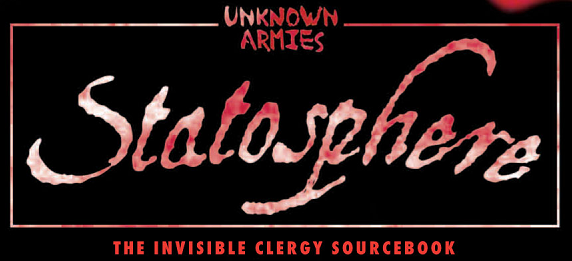 The Martyr Another fairly self-explanatory Archetype. To follow the path of the Martyr you have to choose a cause. There's no real limit on what your cause can be: spiritual, philosophical, political, etc. are all fair game. It's noted that Martyrs are more commonly ignorant Avatars than not. There are few people willing to literally Martyr themselves for a cause they don't actually believe in and "true believers" rarely require knowledge of the occult to walk the path. Taboo: The Taboo of the Martyr is very simple: you can't put your own well-being (or that of anyone else) over the good of your cause. Suspected Avatars: Too many to count. Channels: 1-50%: When working in support of your cause you may add your Avatar skill to Body skills related to enduring pain, resisting fatigue, etc. 51-70%: You can re-roll or flip-flop any failed skill roll in exchange for taking Wound points equal to the sum of the dice if the roll then succeeds. The action also has to be in the name of the Martyr's cause. 71-90%: With a Martyr check you make transfer an injury to yourself (remember, damage is tracked per wound), so long as the person injured was acting in support (or was important to) your cause. You can even use this to retroactively undo a killing blow (so long as you can see the victim and you activate the ability immediately)...this rewrites reality to cause you to leap in front of the blow or otherwise "take the hit". 91%+: So long as you die in the name of your cause you can give your death meaning. You can either inflict the same damage you suffered (flip-flopping if desired) to all foes present at the time or you can choose for your death to become known to other believers in your cause. It doesn't matter how well hidden or lonely your death is...knowledge will spread via some kind of coincidental record becoming publicly available, or even simply an oddly accurate urban legend. Eh....functional but the Martyr doesn't exactly make for a flashy write-up, most of the abilities are more or less exactly what you think of the moment you hear the Avatar's name. The Necessary Servant  "Very good, sir." The Necessary Servant is the vizier, the loyal butler or indispensable secretary. There are two primary elements to the Necessary Servant Archetype. First, they must be relatively anonymous and lowly subordinates (it's not merely enough to be lower on the totem-pole than the big boss). Second, they must be essential to their superior(s)...the servant's master must need them more than the servant needs the master. This means they must be useful and dedicated, going above and beyond the call of duty and performing with exceptional ability. Taboo: The servant can never take charge directly, they're a bit like the Executioner in that they must always act in the "boss". However, they don't have to slavishly obey their master...a Necessary Servant can act without orders and can even lie about their orders but these actions must still be in the name of another. You can't half-rear end things either...if you're given an order or a duty to perform then you must complete it to the best of your ability. Suspected Avatars: Of course, the best Necessary Servants don't go down in history at all, but some suspected avatars have included Queen Elizabeth's spymaster Walsingham and Hitler's confidant Martin Bormann. Channels: 1-50% The first channel is interesting, but potentially more of a disadvantage than an advantage. All Avatars of the Necessary Servant (knowing avatars or otherwise) automatically recognize one another, usually with a vaguely favorable impression. For one Avatar to directly act against another requires an Avatar roll that succeeds higher than the other Avatar's skill. This means it's impossible for one servant to directly act against another with a higher Avatar rating so it's unclear how you would unseat the Godwalker...better wait for them to screw up and violate taboo. 51-70% With an Avatar roll you can perform Exalted Bureaucracy Charms. Basically you can use your Avatar skill to intuit the clockwork of a organization, company, government agency, etc. This means that not only is it easy for them to cut through red tape since they can go straight to the person they most need to talk to (whether or not that person is "officially" the one who handles things), but they also know the weak points of any such group. They can tell who will take bribes, who doesn't work hard at their job and the workers whose loss would hurt the organization the most. Considering that this can also include things like cults, security teams, law enforcement, etc this is a really useful channel. 71-90% You are a perfect social chameleon can (with an Avatar roll) fit into any place and seem like you belong. So long as you don't take any action that directly draws attention to his out-of-placedness. For instance, you could walk into a high-society party in boxers and a tank top and everyone would think you're dressed perfectly...until you grab someone's butt or otherwise act out of place. Your features and details become non-memorable and vague and everyone simply overlooks you. 91+ You can imbue others in your organization or team with supernatural ability by giving advice and tips. So long as the subject accepts the support then you can add any amount up to your Avatar skill (presumably at least...no limits are ever actually stated) to a single appropriate skill of your choice for up to 24 hours. So a manservant could suggest and outfit and topics of polite conversation for their employer to boost their Charm skill for a date or an important meeting. Likewise, if you're a CEO's secretary and you know an attempt on his life is imminent you could give his bodyguard suggestions or support to boost his Notice skill. The downside is you can only do this for a single person at a time and doing so hinders your own Avatar abilities...the bonus you grant becomes the minimum necessary roll for any Avatar abilities while the bonus is active (so giving someone a +50% bonus means that your Avatar skill rolls fail if they come out under 50). However, you can always rescind the bonus at any time and remove the penalty. Since there's no reason that a Necessary Servant can't be "support" for a magickal Cabal it's easy to see some pretty impressive moves being pulled off with this Channel. Suggesting good vantage points to an assassin or packing your dipsomancer master's flask of his favorite whisky can be powerful boosters. The Outsider This is the Archetype that convinced me to write-up the Statosphere book, mostly due to the goofy third Channel. The Outsider's theme is a catch-all for any and all of those who don't "fit in". This could be due to ethnicity, gender, economic factors, etc. Generally speaking, the Outsider should also be "needed" by the community they operate in but also feared or mistrusted (the latino nanny for a rich white family, the affirmative action hire, the "token" whatever). However, this isn't really reflected in the taboo and many examples are more cases of basic prejudice than the "need/distate" dynamic. Taboo: The Outsider must live among those who do not fully trust them. Total acceptance or total isolation both break taboo. This is, unfortunately, pretty vague and difficult to pin down mechanically. Especially problematic is tying down exactly how much "rejection" is necessary...does being a gay man in a "Red State" count or do they actually have to live above a conservative baptist church or something? Needless to say it's not a conversation I'd feel very comfortable having with many people ("No, you aren't being persecuted enough to qualify" is certainly not something you want to say to anyone). Overall, I'd say the Outsider is definitely not an Archetype suitable for a lot of groups. Suspected Avatars: You'd think Pocahontas would be a strong contender. Other obvious examples are integration history-makers like Jesse Owens. Channels 1-50%: You are both seductive and terrifying. You can flip-flop rolls dealing with either frightening or seducing those who are not of your persecuted group. A matched success leads to either obsessive passion or total fear (Rank-5 Helplessness check). I've got to say, I'm not really sold on this channel. While there's certainly some precedent for the flip-side of prejudice coin being "exotic appeal" it's certainly not a universal thing and the Outsider is already trying to cover so many different different marginalized groups that it just feels reductive to try and make the case that this is going to fit every "outsider" in some way. 51-70% Prejudice hardens you. When the Outsider fails a Madness check caused by the hardship they face from their community the Outsider can roll their Avatar skill to turn the Failed notch into a Hardened Notch. Not a very impressive ability for a second channel, especially since it mainly helps you when resisting the consequences of following the Outsider path to begin with. The description of prejudice turning you into a monster is also somewhat uncomfortable as well. 71-90% While the first two channels sit pretty firmly in "should I be offended by this?" territory, the third channel takes a turn to goofball island and the Outsider becomes downright comedic. With this Channel (and a successful Avatar roll) your Outsider status becomes infectious. Your bodily fluids can infect a target, transforming them into an example of your "outsider"-ness. Meaning that you can have sex with someone and turn them black or gay....you can spit in someone's coffee and they'll turn into a woman. Since saliva is a vector for the transformation you can even infect people zombie-style: bite someone and their foreskin will disappear (yes, transmitting circumcision is given as an example). The effect lasts for 24 hours. Obviously, this can be fairly devastating without any "social" consequences, since most targets are likely going to be making hefty Self and Unnatural checks. Of course, with willing targets you could always help someone re-enact that "Loise Lane Turns Black" superman comic. 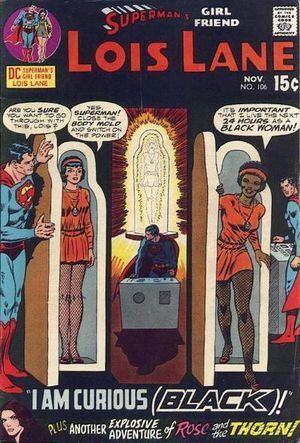 91+% This channel reinforces the "need" the community apparently has for the Outsider by preventing them from physically attacking you. Anyone who wants to attack you must make a Self-10 check. Magickal, emotional or social "damage" is fine however. This is one of those channels that's going to be extremely powerful (if for instance it means that you can't be harmed by basically anyone in the city you live in) or extremely weak, depending on how the Outsider "community" requirements are determined. I've got to admit, I kind of hope that the Outsider godwalker's custom channel is a modification to the 3rd channel to go full-zombie. Those infected by you can then infect others just for the sheer lunacy of it.
|
|
|
|
So this apparently exists, but I'm not reviewing it.quote:The CreepyPasta RPG contains everything you need to make your favorite creepypastas come to life in your own roleplaying universe. This book and a handful of dice are all you need to get underway. The CreepyPasta RPG uses a new "buy-die" roleplaying system that promises easy to understand mechanics that do not falter under complex scenarios. That said, here's some choice material from the DriveThru preview. quote:There are nine attributes in CPRPG, and each attribute will have a number of dice which represent how good or bad a character is at a task. For example, you could have five eight-sided dice, (5D8) and two ten-sided dice (2D10) in your Strength attribute. Dice are rolled for any given task. You may have up to 2D12, 4D10, and 8D8 purchased in any given attribute. When the Game Master (GM) asks you to roll an attribute, you roll up to Four dice of those purchased. Once you roll the dice, you ignore all but the top two highest results, and add them together. For example if you rolled 2D12 & 2D10, and rolled 2-5-5-9, then you would only count the top two and add them together. In this case you would add 9 and 5, making your result 14. GMs will often give you a ‘difficulty’ for a task, such as 12. In which case, you must meet or exceed the given diffi culty in order to complete said task. quote:Exploding Dice quote:SIMPLE EXAMPLE OF AN ATTRIBUTE ROLL
|
|
|
|
oriongates posted:71-90% While the first two channels sit pretty firmly in "should I be offended by this?" territory, the third channel takes a turn to goofball island and the Outsider becomes downright comedic. With this Channel (and a successful Avatar roll) your Outsider status becomes infectious. Your bodily fluids can infect a target, transforming them into an example of your "outsider"-ness. Meaning that you can have sex with someone and turn them black or gay....you can spit in someone's coffee and they'll turn into a woman. Since saliva is a vector for the transformation you can even infect people zombie-style: bite someone and their foreskin will disappear (yes, transmitting circumcision is given as an example). The effect lasts for 24 hours. "Worlds Easiest Bris, Painless, no muss, no fuss."
|
|
|
|

|
| # ? Apr 16, 2024 12:01 |
|
I'd like to point out that DrivethruRPG does in fact sell Gamma World 7th Edition on PDF. More importantly, they offer a print-on-demand option for the loot and mutation cards. The books themselves are still in PDF-only, but the cards at least can be printed. http://www.drivethrurpg.com/product/161306/DD-Gamma-World-RPG-GW7e And the booster cards: http://www.drivethrurpg.com/product/161308/DD-Gamma-World-RPG-Booster-Cards-GW7e And the Legion of Gold expansion pack: http://www.dndclassics.com/product/168070/Gamma-World-Expansion-Pack-Legion-of-Gold-GW7e And the Famine in Far-go expansion pack: http://www.drivethrurpg.com/product/167565/Gamma-World-Expansion-Pack-Famine-in-Fargo-GW7e gradenko_2000 fucked around with this message at 16:30 on Jan 7, 2016 |
|
|

